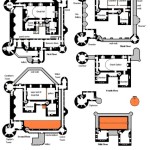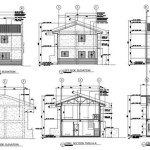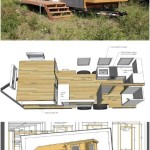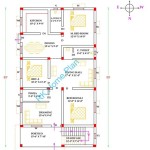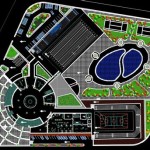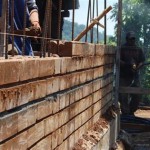Bungalow Home Plans With Basement: Expanding Space and Value
Bungalow home plans with basements combine the charm and convenience of a bungalow's single-story living with the additional space provided by a basement. This design approach offers a practical solution for homeowners seeking to maximize their living area without expanding the home's footprint. The basement can be finished and used for a variety of purposes, effectively doubling the home's usable square footage. This article will explore the advantages, design considerations, and functional possibilities associated with bungalow home plans that incorporate basements.
Bungalow architecture typically features a low-pitched roof, wide eaves, and a prominent front porch. This style emphasizes horizontal lines and a connection to the surrounding landscape. Adding a basement to a bungalow plan requires careful consideration of structural integrity, drainage, and access. However, the benefits often outweigh the challenges, providing valuable storage, recreational space, or even additional living quarters.
Advantages of Bungalow Home Plans With Basements
The inclusion of a basement significantly enhances the functionality and value of a bungalow. The benefits extend beyond simply adding square footage.
One primary advantage is the increased living space. A finished basement can accommodate bedrooms, bathrooms, a home office, a recreational room, or even a complete in-law suite. This is particularly beneficial for growing families or homeowners who desire a dedicated space for hobbies, entertainment, or work. The basement provides a flexible area that can be adapted to changing needs over time.
Another key benefit is the enhanced storage capacity. Basements provide ample space for storing seasonal decorations, tools, equipment, and other items that may clutter the main living areas. This helps to maintain a clean and organized living environment on the primary floor. The basement can also be used for storing food preserves, wine, or other items that require a cool and dark environment.
Furthermore, a basement can contribute to improved energy efficiency. The earth surrounding the basement walls helps to regulate temperature, keeping the home cooler in the summer and warmer in the winter. This can result in reduced energy consumption and lower utility bills. The basement also provides a buffer against extreme weather conditions, protecting the home from drafts and cold air infiltration.
Finally, a finished basement can significantly increase the resale value of a bungalow. Prospective buyers often view a finished basement as a valuable asset, providing additional living space and functionality. This can make the home more attractive in a competitive real estate market. The investment in finishing a basement can often yield a significant return in terms of increased property value.
Design Considerations for Bungalow Basements
Designing a bungalow basement requires careful attention to several key factors to ensure functionality, comfort, and structural integrity.
One of the most important considerations is proper waterproofing. Basements are inherently susceptible to moisture problems due to their location below ground level. Effective waterproofing measures are essential to prevent water damage, mold growth, and structural issues. This may involve applying a waterproof coating to the exterior foundation walls, installing a drainage system around the perimeter of the foundation, and ensuring proper grading to direct water away from the home.
Adequate ventilation is also crucial for maintaining a healthy and comfortable basement environment. Basements tend to be damp and prone to poor air circulation. Installing a ventilation system or using dehumidifiers can help to remove excess moisture and improve air quality. This will prevent mold and mildew growth and create a more comfortable living space.
Natural light is often limited in basements, so careful consideration should be given to lighting design. Installing larger windows or window wells can help to bring in natural light. Recessed lighting, strategically placed lamps, and light-colored paint can also help to brighten the space and create a more inviting atmosphere. The use of mirrors can further enhance the effect of light reflection.
Floor covering is another important design decision. Concrete floors can be cold and uncomfortable, so it is important to choose a flooring material that provides insulation and comfort. Popular options include carpeting, laminate flooring, engineered wood flooring, and tile. The choice of flooring will depend on the intended use of the basement and the desired aesthetic.
Basement ceiling height should also be taken into account. Low ceilings can make a basement feel cramped and uncomfortable. Building codes typically specify minimum ceiling heights for habitable spaces. Raising the ceiling height can significantly improve the overall feel of the basement. This may involve underpinning the foundation or lowering the basement floor.
Functional Possibilities of a Bungalow Basement
The potential uses for a bungalow basement are limited only by imagination and budget. The space can be tailored to meet a wide range of needs and preferences.
A popular option is to create a recreational room or home theater. This provides a dedicated space for entertainment, relaxation, and family gatherings. The basement can be equipped with a large screen television, comfortable seating, a game table, and a wet bar. Soundproofing the walls can help to minimize noise transmission to the main living areas.
Another common use is to create a home office or study. This provides a quiet and private space for work, study, or creative pursuits. The basement can be equipped with a desk, bookshelves, a computer, and other necessary office equipment. Good lighting and ventilation are essential for creating a productive work environment.
A basement can also be used to create additional bedrooms and bathrooms. This is particularly useful for growing families or homeowners who frequently have guests. The bedrooms should be well-ventilated and equipped with egress windows for safety in case of fire. The bathrooms should be properly ventilated to prevent moisture problems.
Furthermore, a basement can be transformed into a home gym or fitness center. This provides a convenient and private space for exercising. The basement can be equipped with treadmills, weight machines, and other fitness equipment. Proper ventilation and flooring are essential for creating a comfortable and safe workout environment.
Finally, a basement can be used as a workshop or hobby room. This provides a dedicated space for woodworking, crafting, or other hobbies. The basement can be equipped with workbenches, tools, and storage cabinets. Proper ventilation and lighting are essential for creating a safe and functional workspace.
The integration of a basement into a bungalow home plan offers a significant opportunity to expand living space and enhance the overall functionality of the home. Careful planning and design are essential to ensure that the basement is waterproof, well-ventilated, and comfortable. With proper consideration, a bungalow basement can be transformed into a valuable and versatile space that meets the unique needs of the homeowner.
When considering a bungalow with a basement, it's crucial to research local building codes and regulations. These codes dictate minimum ceiling heights, egress window requirements, and other safety standards. Compliance with these regulations is essential for ensuring the safety and legality of the finished basement.
Furthermore, it is important to consult with a qualified architect or contractor who has experience in designing and building basements. A professional can provide valuable guidance on design considerations, waterproofing techniques, and other important aspects of basement construction. They can also help to ensure that the project is completed on time and within budget.
The decision to include a basement in a bungalow home plan is a significant one, but it can be a worthwhile investment that adds value and functionality to the home for years to come. By carefully considering the advantages, design factors, and functional possibilities, homeowners can create a bungalow basement that meets their specific needs and enhances their overall quality of life.

Simple House Floor Plans 3 Bedroom 1 Story With Basement Home Design 1661 Sf Basementdesignflo One New

Versatile Spacious House Plans With Basements Houseplans Blog Com

Don Gardner Walkout Basement House Plans Blog Eplans Com

Bungalow With Finished Basement 23562jd Architectural Designs House Plans

Don Gardner Walkout Basement House Plans Blog Eplans Com

Basement Idea Floor Plans House Bungalow

Stylish And Smart 2 Story House Plans With Basements Houseplans Blog Com
Small 2 Bedroom Bungalow Plan Unfinished Basement 845 Sq Ft

Hillside House Plan Modern Daylight Home Design With Basement

House With Basement Apt Separate Entrance Plans Google Search Bungalow Floor

